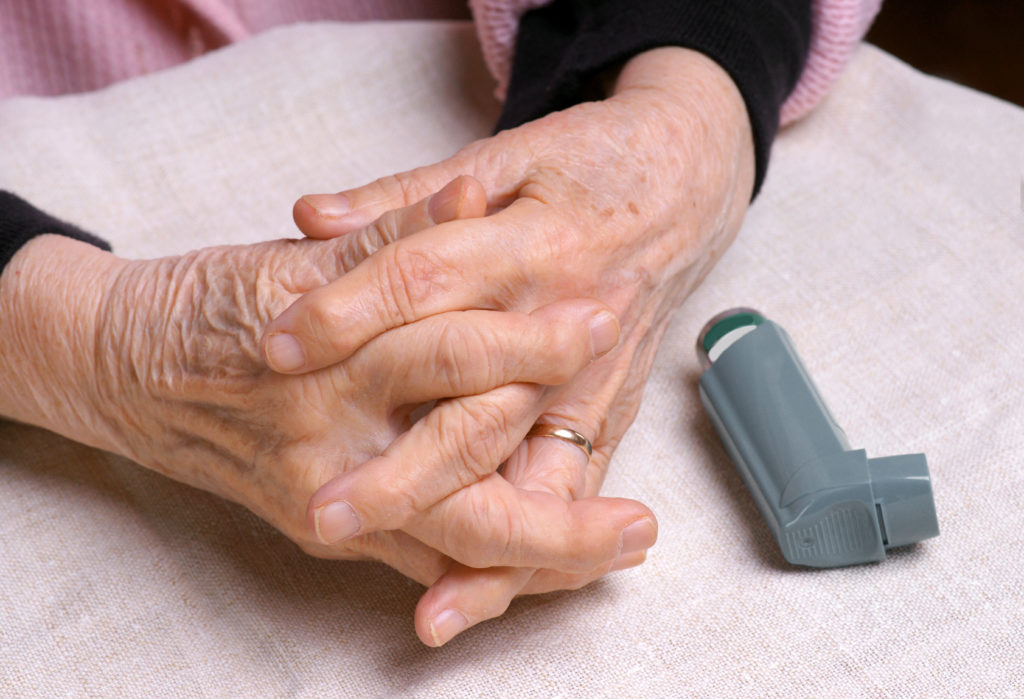According to the Center For Disease Control and Prevention (CDC), asthma affects nearly 25 million people each year in the United States. One in every twelve people has asthma and seniors, people ages 65 and over, account for over four million of those with asthma. But, seniors affected with asthma may be way more than four million, as many elderly asthmatics go undiagnosed and untreated.
Symptoms of Asthma
Asthma is an inflammatory disease of the airways to the lungs which makes breathing difficult and can make physical activities challenging or impossible. Asthma symptoms occur when the lining of your airways swell and the muscles around them tighten and mucus fills the airways, reducing the amount of air that can pass through. Some common symptoms to look out for include: coughing when laughing, exercising, or at night, wheezing, tightness in the chest, shortness of breath, and fatigue. If not treated, seniors with asthma are at risk for serious health problems. For older adults, asthma has much greater risks as they can develop respiratory failure during even mild episodes or symptoms.

Treatments
There are a variety of treatment options for severe asthma symptoms which include prescription medications, lifestyle changes, and natural remedies. This article will discuss natural remedies to be used with asthma medications, like inhalers and medications, to help manage the symptoms of asthma. But, it’s important to note that these natural remedies are in no way a cure for asthma, as they only help alleviate symptoms and should be used in conjunction with prescription medications.
Steam Bath
Warm baths can help clear the irritation of airways and nasal congestion associated with asthma. The steam may alleviate some of the symptoms as it helps provide moisture to your airways. But, for some people, the steam can actually make the symptoms worse because of the heat. So, just be mindful of that.
Omega-3 Fatty Acids
Found in oily fish, Omega-3 fatty acids have been shown to help prevent and treat cardiovascular disease by reducing your immune system’s reactivity and your airway inflammation. By eating more tuna, trout, salmon, mackerel, and sardines, you can boost your lung function and reduce the inflammation in your airways. Dark, leafy greens like spinach and kale, nuts, and vegetable oils are also a good source of Omega-3 fatty acids.
Ginger
Ginger, a natural remedy for nausea, has been shown to treat asthma due to it’s strong antioxidant and anti-inflammatory properties. Try brewing some tea or eating foods with ginger in them.
Garlic
Another natural remedy, garlic helps manage a bunch of illnesses including asthma because of its anti-inflammatory agent. Garlic also has antibacterial properties that help you fight respiratory illnesses which can worsen your asthma symptoms.
Essential Oils
Vapor rubs made from essential oils can help by thinning and clearing the buildup of mucus in the air passageways. Essential oils to use include peppermint oil, eucalyptus oil, frankincense oil, and lavender oil. Eucalyptus thins the mucus helping to clear it out, peppermint oil helps unclog your sinuses, frankincense oil reduces inflammation of your airways and your lymph nodes, and lavender oil reduces inflammation while helping to decrease anxiety, which is often a trigger for asthma attacks.

Honey
Honey is commonly used in cold remedies to alleviate sore throats and reduce coughing and if you mix honey with a hot beverage like tea, it can provide relief for your asthma symptoms. Honey has many antioxidants and the sweet taste can cause you to produce more saliva, lubricating your airways.
Caffeine
Coffee and tea are not just warm beverages to give you energy, caffeine acts as a bronchodilator and reduces respiratory muscle fatigue. Some studies have shown that it improves airflow for up to four hours after drinking it.
Dietary Changes
There’s no go-to diet for those with asthma, but being overweight can worsen asthma symptoms. Maintaining a healthy and nutritious diet with tons of fruits and vegetables (sources of antioxidants) can reduce inflammation around your airways. Certain foods can actually cause asthma symptoms to flare up, so it’s best to avoid these foods and to consult with your doctor.
Breathing Exercises
Regular breathing exercises and yoga can improve the symptoms of asthma as well as your general well-being. Some breathing techniques include the Buteyko Breathing Technique (BBT), which focuses on breathing out of your nose instead of your mouth, and the Papworth method, which involves using your nose and diaphragm to develop breathing patterns.
Mindfulness
One of the best things about mindfulness is that it can be done almost anywhere. This type of meditation connects your mind and body to the present moment. You just need a quiet place to sit down, close your eyes, and focus your attention on your thoughts, feelings, and your body. The stress-relieving benefits are a great addition to your prescription medication.










